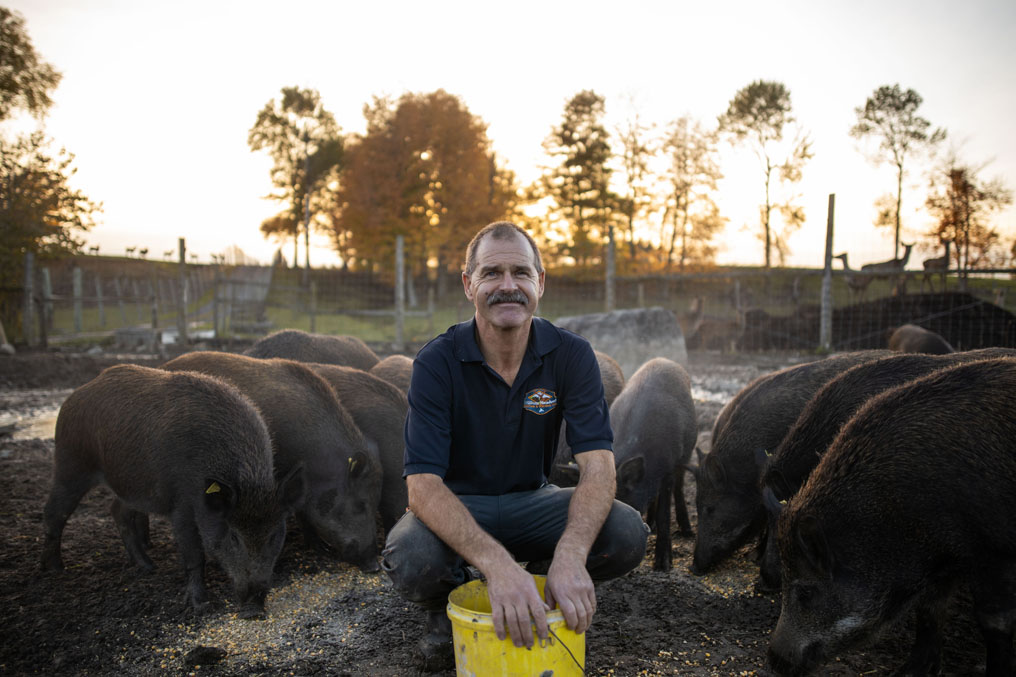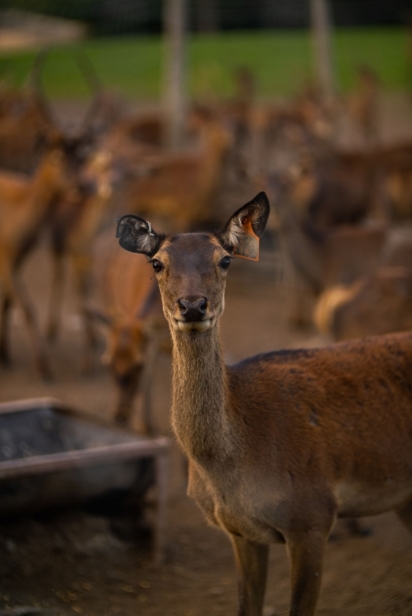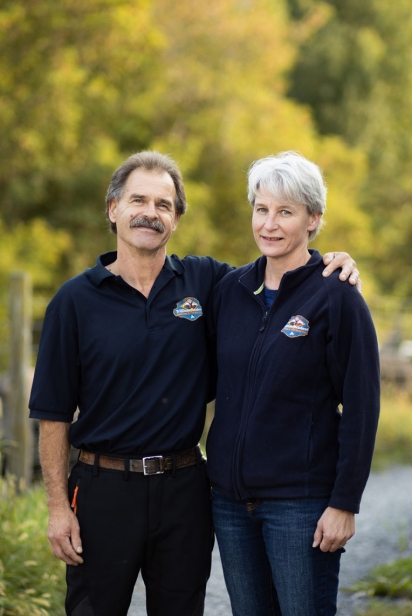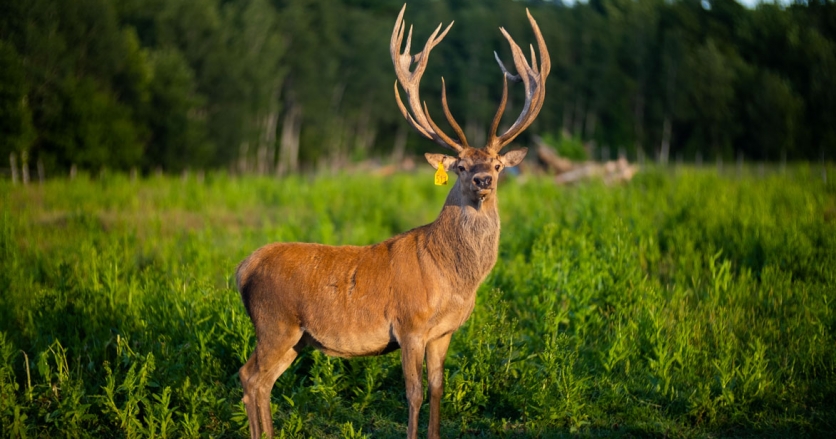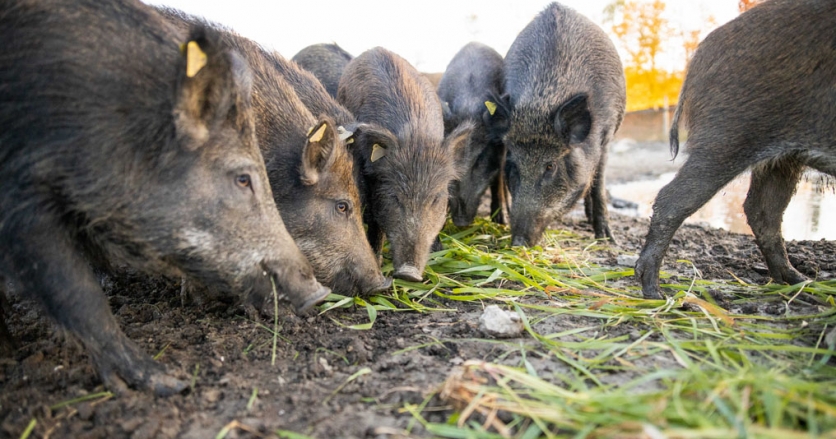Virtuous Venison and Wild Boar
On a bucolic misty early September morning, hundreds of red deer loom majestically through the half-light, silhouetted against towering mature pine trees and scattered over rolling farmland, while darkly hairy wild boars dig quietly around a fence line, waiting for their morning feed.
All is calm on the 100 acres of Trillium Meadows farm and the animals are happy to see owner, Hans Lindenmann approach on his tractor with the front bucket filled with feed. They have no inkling of the forces that buffet those responsible for their care.
Farming is a story of waves and troughs. There are so many factors beyond a farmer’s control; heat waves and droughts, torrential rain and floods. Then there are market fluctuations; one year there’s a glut of commodities, the next they are in short supply. And now there’s the impact of COVID and decisions made by bureaucrats far from the land, to add to this complicated mix.
For Hans and Marianne Lindenmann, and the 80 wild boar and 200 red deer on their farm near Vankleek Hill, an hour east of Ottawa, the initial shutdowns saw an increase in farmers’ market interest and sales. The Lindenmanns sold the most meat since they bought the farm in 1998. But now, with restaurant re-openings, that interest has waned somewhat as people return to dining out, and the cost of necessities such as ear tags and fencing posts, to say nothing of feed for the animals, has sky- rocketed. “Whereas barley used to cost about $100 a ton,” Hans explains, “it now costs $300. It’s the same for corn. Those prices have jumped from $200 a ton to up to $360. And I just don’t want to raise my prices because nobody will want to buy the meat and I want to keep good meat accessible to the public and my loyal customers.” All of this squeezes already limited profit margins.
Part of the problem is China, Hans explains. The Chinese are buying millions of tons of soybeans from Brazil and corn from wherever they can get it. This is driving prices through the sky for small-scale farmers such as the Lindenmanns.
The expense of this is compounded when raising wild boar. Unlike domestic pork production, whereby a pig is born in the spring and goes to slaughter in the fall, wild boars grow at about 30 per cent the rate of pigs and take a full two years to mature to a slaughter weight of approximately 200 pounds. “That’s a lot of extra food to give them,” Hans points out.
And then there’s the existential threat to this business at all: The Ontario government is trying to shut wild boar farms down. There are moves afoot to declare them an invasive species, which will be swiftly followed by an order to close, Hans believes. “There are some in Voyageur Provincial Park, but they escaped from the Quebec side,” he explains. Neither the Forestry and Wildlife Association nor the Pig Association — Hans is a member of both — is interested. He has invited the bureaucrats to his farm with its sturdy, neat fences, buried deep below ground to prevent any escapes. “But they’re not interested,” he says. Largely, he thinks they’re not interested because there are only six wild boar farms in Ontario. “They wouldn’t dare touch the dairy farmers,” he says.
There are hundreds of antlers hooked over a fence, bleaching white in the sunshine. It’s a strangely pre-historic sight, one which when combined with the guttural roar of a red deer and the deeply pitched snort of a boar, is other-worldly. Hans recently removed a set with 27 points. Deer antlers are an important by-product of raising the animals for meat. They need to be removed for safety reasons, so that rutting deer don’t injure one another, so that they don’t get caught in fences and injure themselves and so that they don’t destroy the bark of trees in their pastures. For a while, Hans harvested the velvet, used in a range of natural supplements, primarily for athletes and bodybuilders. But now, it’s pet owners who enjoy these bones. After harvesting — which is a complicated business in itself, requiring sedatives and an anti-sedative to wake the animal up because deer cannot lie prone for long without stomach damage — Hans uses a skillsaw to cut them into a range of sizes for dog chews. They are long-lasting, tasty and good for cleaning of teeth.
As the deer head into rutting season, with their lion-like roars echoing around the surrounding countryside, each doe should produce one calf by early June next year. October marks the beginning of the inexorable cycle of new life on this farm, one that has sustained the Lindenmanns since 1998 when they bought it. Hans and Marianne are from the same region in Switzerland, where Hans had farming experience and some knowledge of handling wild boar and deer. Marianne’s parents owned a dairy farm near Vankleek Hill and were looking Hans and Marianne Lindenmann, far right, are from the same region in Switzerland, where Hans had farming experience and some knowledge of handling wild boar and deer. Marianne’s parents owned a dairy farm near Vankleek Hill and were looking to downsize. Trillium Meadows, a deer farm at the time of purchase, was on the market. When Marianne’s parents decided it wasn’t what they were after, the couple stepped in. They introduced wild boar shortly thereafter and have been farming here for more than 20 years. “It’s ironic that after a year when we have been our most successful, we may still make no money,” Hans says with resignation.
Wild boar and venison are extremely healthy proteins and lean meats. There is no such thing as marbled venison: a deer has just five per cent body fat. It also contains iron, zinc and many of the B vitamins. And at Trillium Meadows, it is raised naturally, without growth hormones, antibiotics and dyes, free to roam in giant pastures.
It’s the same story for the boar. These animals are kept outside throughout the year. Their diet gets supplemented with brewer’s grain from Beau’s All Natural Brewery, corn, oats, hay silage, pumpkins and other vegetables.
“Our philosophy is to keep our animals’ diets as natural as possible. They are slow-grown animals and not pushed with special hog feed ration to get them to slaughter weight in the least amount of time,” the farm’s website asserts.
This high-quality meat is served at Gray Jay, chef Dominique Dufour’s Canadian-only-ingredients fine dining restaurant on Echo Drive overlooking the canal; at Prohibition House, a gastropub in Ottawa’s Centretown and at recent Gold Medal Plates-winning restaurant Black Tartan in Carleton Place. Prime venison and boar cuts, as well as ground meat, sausages, charcuterie and antlers can be found at the Vankleek Hill Farmers’ Market, the Ottawa Farmers’ Market at Lansdowne, the Cornwall Kinsmen Farmers’ Market and the Glengarry Market, as well as at the farm gate, by appointment.
Trillium Meadows Red Deer and Wild Boar Farm
1814 Beauchesne Rd., Vankleek Hill, Ont.
trilliummeadows.ca | 613.678.1679


